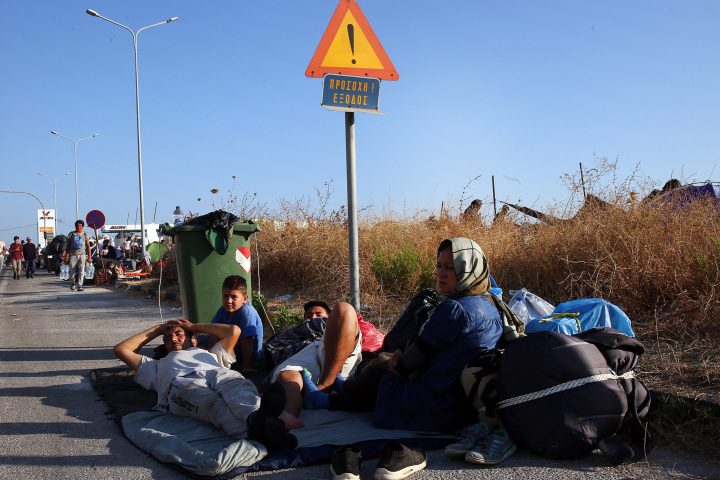Newsdeck
Migrants without shelter on Lesbos after fire, locals oppose shelter plans

LESBOS, Greece, Sept 11 (Reuters) - Thousands of migrants remained stranded without shelter on the island of Lesbos for a third day on Friday, sleeping on streets or in fields near Greece's largest refugee camp after a devastating fire burned the facility to the ground.
The Moria camp, long notorious for poor living conditions, had hosted more than 12,000 migrants, four times its stated capacity. Wednesday’s fire turned the sprawling site into a mass of smouldering metal and melted tents.
The Greek government said it had secured thousands of tents to provide temporary shelter for the migrants. A passenger ferry docked at the island’s port of Mytilene to help provide assistance.
But Athens’s plans face stiff resistance from local authorities and residents who fear the temporary shelters will turn into another permanent migrant camp.
“It is a tragic opportunity for migrants to leave … Moria is a monstrosity,” Dimitris Koursoubas, a senior official responsible for migration in the northern Aegean islands, told Reuters. “We want all the migrants out, for national reasons. Moria is over.”
Local attitudes on an island at the forefront of the European migrant crisis of 2015-2016, though initially welcoming, have turned largely hostile as the camp population expanded. Most migrants are from Afghanistan and Syria.
“MORIA FINISHED”
Thousands of migrants slept on roadsides and fields for a second night on Thursday. Others camped in a cemetery.
“Moria finished,” said Zohra, a 25-year-old Afghan woman. “We are two days on the road, no water, no food, very cold at night.”
Some European Union countries have offered to take in the refugees, Greek Migration Minister Notis Mitarachi said late on Thursday, without elaborating. Cities and regional governments in Germany have also offered to take in people, but this can only happen if the federal government in Berlin allows them.
“Moria is here to remind us of a Europe we need to change,” European Commission Vice-President Margaritis Schinas who visited Lesbos told the Athens New Agency.
Some EU member states including Hungary and Poland have previously refused point-blank to take in any of the migrants who have been arriving in southern Europe in the past few years.
The Greek government has said the fire was started by asylum seekers reacting to quarantine measures after COVID-19 was detected in the camp, though it has not provided any evidence.
Thirty five people who fled the fires in the early hours of Wednesday had tested positive for COVID-19, further complicating efforts by the police and local authorities to gather the migrants in one place, near the port, and to provide shelter.
The camp was quarantined last week after a 40-year-old man tested positive for COVID-19. Bracing for a possible surge in cases, authorities were sending 19,000 test kits to the island. (Writing by Angeliki Koutantou and Renee Maltezou; Editing by Gareth Jones)



















 Become an Insider
Become an Insider
Simple remedy. Return them from whence they came. Land invasions are the scourge of the 21st Century.
Heart-breaking though this story is one can sympathise with the residents of Lesbos. The days of mass migration are over. Up till about the middle of the 19th century there was space and resources available in sparsely populated areas to absorb large numbers of people seeking a better life. Now there are too many people infesting all habitable areas and even in developed countries youth unemployment is high and poverty and homelessness are on the increase. In a country like Greece, which is itself struggling with economic meltdown, the will to dispense largesse is diminishing rapidly. If accepting the hordes of migrants into developed countries could solve the global issue of over- population one might be able to sympathise with the do-gooders but unfortunately all it will do is shuffle the problem from one place to the next. The only lasting solution is to reduce drastically our propensity for reproduction and educate the swathes of people from the third world so that they can solve their own problems and not have to brave a hazardous journey to run away from them.